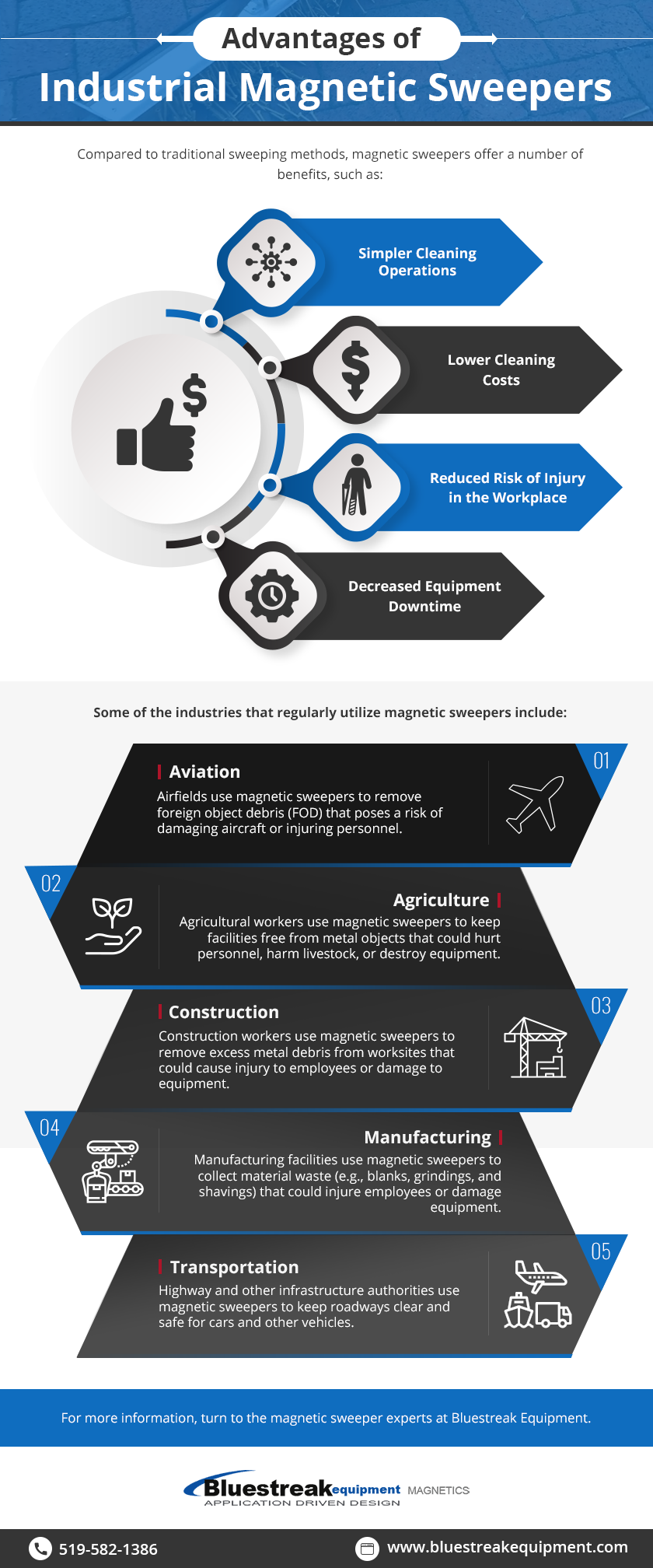Industrial Uses of Magnets
Industrial magnets play a vital role in numerous systems and operations. While these magnetic devices rely on the same principles as the ones used for residential purposes (e.g., sticking items to a refrigerator), they generally have more specific requirements and restrictions regarding composition, type, size, and strength, depending on the intended use. The applications for them are highly varied, encompassing many purposes and processes across a wide range of industries. Below, we highlight some examples of common uses.
Industrial Magnets for Object Removal
One of the key uses of magnets in the industrial sector is object removal. For this purpose, they are often integrated into machines known as magnetic sweepers, which enable workers to remove potentially harmful or damaging metal objects (e.g., debris or forgotten tools) from work environments. This is essential to keeping the area clean and safe for people and equipment working or moving through it.
Compared to traditional sweeping methods, magnetic sweepers offer a number of benefits, such as:
- Simpler cleaning operations
- Lower cleaning costs
- Reduced risk of injury in the workplace
- Decreased equipment downtime
Some of the industries that regularly utilize magnetic sweepers include:
- Aviation. Airfields use magnetic sweepers to remove foreign object debris (FOD) that poses a risk of damaging aircraft or injuring personnel.
- Agriculture. Agricultural workers use magnetic sweepers to keep facilities free from metal objects that could hurt personnel, harm livestock, or destroy equipment.
- Construction. Construction workers use magnetic sweepers to remove excess metal debris from worksites that could cause injury to employees or damage to equipment.
- Manufacturing. Manufacturing facilities use magnetic sweepers to collect material waste (e.g., blanks, grindings, and shavings) that could injure employees or damage equipment. The collected material can then be processed for disposal or reuse as appropriate.
- Transportation. Highway and other infrastructure authorities use magnetic sweepers to keep roadways clear and safe for cars and other vehicles.

View Our Selection Of Magnetic Sweepers
Industrial Magnets for Material Separation
Another key use of magnets in the industrial sector is material separation. For this purpose, they are integrated into equipment known as magnetic separators, which are designed to capture and remove ferrous metal contaminants from other materials during processing operations. This step is important as it helps ensure product purity and safety and protect the processing equipment.
There are many types of industrial magnet separators available. Some of the most commonly used are:
- Drum separators. These magnet separators work by passing the product over a rotating magnetic drum. Any ferrous contaminants are captured by the drum surface, rotated out of the material stream, and collected in a container.
- Plate separators. These magnet separators work by mounting a magnetic plate inside of the product chute. As the product slides down the chute, the magnetic field generated by the plate attracts and collects any ferrous contaminants.
- Pulley separators. These magnet separators work by using a magnetic roll as the head pulley in a belt conveyor system. The pulley attracts and collects any ferrous contaminants as the material discharges off the belt.
- Tube, grate, or drawer separators. These magnet separators remove ferrous metal contaminants through direct contact. They work by positioning one or more magnetic tubes in the material stream. As the product touches the tube(s), any contaminants are captured and held.
Industrial Magnets for Material Handling
Material handling is another key use of magnets in the industrial sector. For this purpose, they are integrated into tools engineered for lifting, manipulating, and moving loads. Typical materials for which these tools are utilized include bars, billets, coils, plates, rebar, and slabs.
Compared to traditional load lifting, manipulation, and moving equipment (e.g., chains, hoists, and hooks), magnetic material handling equipment offers many advantages, such as:
- Lower risk of worker injury
- Faster production speeds
- Greater load handling capacities
- Easier maintenance requirements
- Smaller space requirements
Further Applications
The above list is not all-inclusive. Industrial magnets find use in many other applications across a wide range of industries. For example, they are utilized in electric motors to convert electricity into mechanical force and in generators to convert mechanical force into electricity.
At Bluestreak Equipment, we’ve designed and manufactured application-driven magnetic products for over 15 years, including an extensive range of magnetic sweepers. This experience enables us to deliver effective and efficient magnetic solutions that stand up to some of the harshest environments for a variety of professional needs.
To learn more about our magnet products and how they can benefit your industrial application, contact us today.

